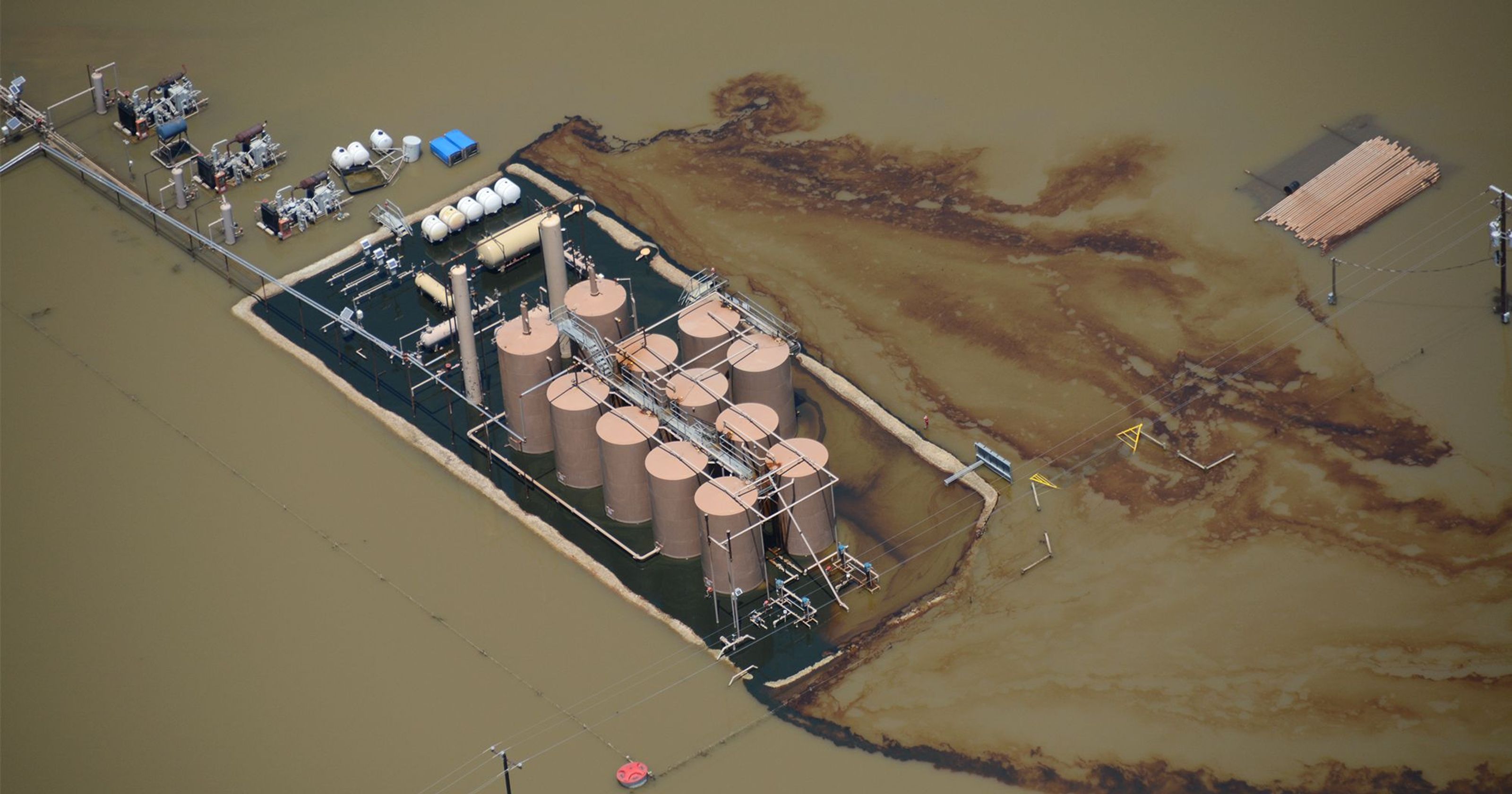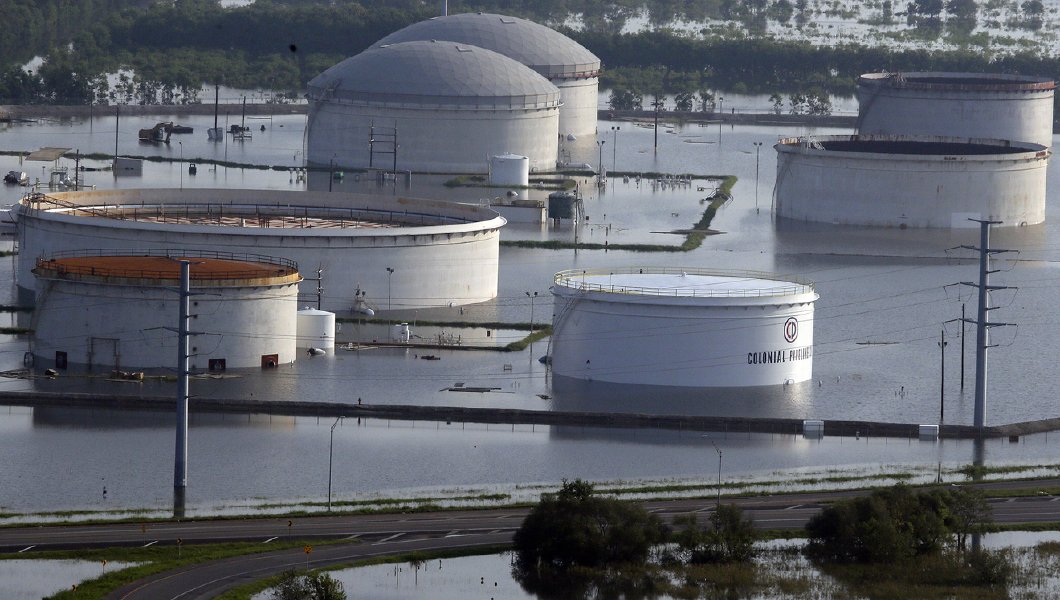There is an important hearing today in Senate Water & Rural Affairs. SB 1446, filed by Sen. Nathan Johnson, would require TCEQ to develop performances standards for aboveground storage tanks - the need for which became glaringly clear after Hurricane Harvey in 2017 as well as the Trinity River floods in 2015. Sen. Johnson is expected to introduce a committee substitute bill, which has language that includes standards to prevent human-caused disasters related to storage tank failures too.
Here is our action alert on it. Let your State Senator know how you feel about this.
Below is our prepared testimony for today's hearing.

Overview
- Above-ground storage tanks that house petroleum and other products should be built to prevent fires, spills, and failure but are poorly regulated and the state requires no performance standards.
- Recent floods and hurricanes have shown how vulnerable above-ground storage tanks are to failure during storms, leading to leaks, spills, and air emissions which were highlighted during Hurricane Harvey and the recent Trinity River floods.
- More recently, the ITC and KMCO fires show that many communities are living next to large above-ground storage tanks that do not even have adequate walls, fire suppression tools, or maintenance requirements.
What Does CSSB 1446 Do?
CSSB 1446 creates an exception to an existing exception in Chapter 26.341 of the Water Code and requires that certain registered above-ground storage tanks at petrochemical plants, petroleum refineries, electric generating facilities, or at a bulk facility meet new TCEQ performance standards to avoid polluting surface and groundwater during floods, hurricanes, or human-made disasters. The bill would cover both existing and new above-ground storage tanks, and require TCEQ to develop performance standards for both. While the bill doesn’t dictate what TCEQ might require, it does direct TCEQ to consider the use of geodesic domes, drain size, the use of internal floating tanks, anchoring the tanks and ancillary equipment, and looking at pressurized water on-site and ensuring walls cannot be breached during a fire or storm.
Does CSSB 1446 cover all above-ground storage facilities?
No, it does not cover smaller facilities under 1,100 gallons, or storage tanks that do not contain certain petroleum-related products. In addition, it does not cover the large crude oil tanks that are currently regulated by the Railroad Commission of Texas, or the smaller storage tanks at oil and gas upstream facilities. It also does not affect existing rules for above-ground storage tanks located above the Edwards Aquifer, which require additional controls.
Doesn’t TCEQ already require that above-ground storage tanks meet performance standards?
No. While TCEQ does require performance standards for underground storage tanks, and does require registration of larger above-ground storage tanks, and can potentially inspect such tanks, there are no specific standards. Certain above-ground storage tanks above the Edwards Aquifer do have some additional plan requirements. In addition, TCEQ does not require above-ground storage tanks to carry financial assurance.
Background on Water Pollution
Hurricane Harvey and previous events, like the Trinity River floods of 2015, revealed that older oil and gas storage tanks are subject to failure. Multiple large petroleum and related-product tanks failed, causing large spills and emissions events, particularly those with external floating roofs. In fact, a database kept by the U.S. Coast Guard found dozens of spills related to failed above-ground storage tanks, in some cases releasing hydrocarbons directly into the environment, including in some neighborhoods in the Houston area. In addition, in other areas, some storage tanks actually floated away downriver. An Associated Press analysis of pollution reports submitted to state and federal regulators found more than two dozen storage tanks holding crude oil, gasoline, and other contaminants ruptured or otherwise failed when Harvey slammed into the Texas coast, spilling at least 145,000 gallons of fuel and spewing toxic pollutants into the air.

Some Recent Headlines
“Magellan gasoline leak is biggest known spill of Harvey aftermath”
“Valero underestimated Houston refinery leak during Harvey”
“Tank failures during Harvey reveal vulnerabilities in storm”

The recent interim report from the Senate Committee on Natural Resources & Economic Development stated:
“Written testimony stated that more than 15 storage tanks holding crude oil, gasoline, and other hydrocarbons failed during the storm and that at least 400 storage tanks in the Houston regions have floating roofs, which were the cause of those failures. Although the failure rate cited above was only 3.75%, the written testimony also cited an article that said these 15 tank failures resulted in a combined 3.1 million pounds of pollutants into the atmosphere. The Committee was told that one possible option to eliminate roof failures in severe flooding events would be to retrofit all existing external floating-roof tanks with geodesic dome covers. TCEQ has provided follow-up information to the committee which confirms that this option is possible, however TCEQ lacks the regulatory or statutory authority to require external floating- roof tanks to be retrofitted with geodesic dome covers. Other options could also be explored, such as requiring internal floating roofs (versus external floating roofs) for all new tank installations in locations that may be affected by a hurricane, or requiring a certain drain pipe size to be utilized on floating roof tanks, as was suggested at the hearing.”
Many community members reported burning eyes, problems with asthma, hospital visits and missed school days from these failures. More recently, the multiple explosions and fires at above-ground storage tanks has created even more health issues and resulting problems in the environment and nearby water bodies.
Photos: Marty Schladen, Moms Clean Air Force